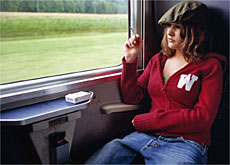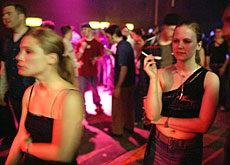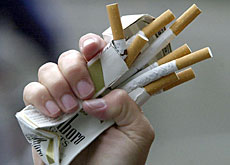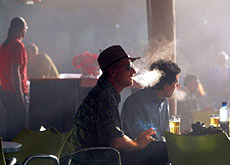Passive smoking clouds a Swiss holiday

Anyone coming to Switzerland for the first time could be forgiven for thinking that smoking is a national pastime.
There are few restrictions on lighting up in public places and a heavy fog hangs in many bars and restaurants.
Jürg Hurter doesn’t mince his words when asked what advice he would give to a non-smoker planning a trip to Switzerland.
“If you don’t like smoke, then avoid Switzerland,” says the president of the Swiss anti-tobacco foundation, Pro Aere (Pro Air).
Around 30 per cent of the Swiss population smoke – one of the highest rates in Europe – and they are allowed to light up in public buildings, including government offices and hospitals.
Fresh air promise
Foreign visitors who come to Switzerland lured by the promise of fresh mountain air first have to deal with smoke-filled airport terminals, railway stations, trains, hotel lobbies and restaurants.
“The population is not willing to insist on their right to have non-smoking restaurants,” says Christian Schwendimann of the association, “A Smoke-Free Zurich”.
“So restaurant managers say ‘we have enough customers who are willing to spend money, so who cares if they smoke or not’.”
Schwendimann’s office, together with the Zurich Lung Association, has set up a website guide, “eat smoke-free” (see “related sites”), to provide some help for non-smokers in search of suitable Swiss restaurants and bars.
The website (currently in German only) lists 160 establishments out of a total of 25,000 restaurants, bars and cafes nationwide.
Zurich smoke-free
Nearly half of those listed are in Zurich and the surrounding area, which makes finding a non-smoking restaurant or bar elsewhere in the country quite a challenge.
The “eat smoke-free” entries are divided into three categories: restaurants which are completely non-smoking; those that have separate non-smoking rooms; and establishments where at least half of the seating is non-smoking.
One smoke-free zone is the Artige Bar and Gallery – a trendy spot in the hip Niederdorf district of the city.
According to the manager, smoking is banned because it would damage the paintings on the walls. But the policy has made the bar popular with non-smokers whose interest in art is only secondary.
Bad for business
Schwendimann says he is sure there are more restaurants around the country which meet the website’s non-smoking criteria, but he believes their managers have not yet heard of the website, or fear the non-smoking label will be bad for business.
“In my opinion, Swiss restaurant managers are conservative when it comes to this issue,” he says.
“Studies show that non-smokers may not sit as long as smokers in a restaurant, but they spend as much, quite often on expensive items like wine.”
Josef Schmidtpeter, director of the Glockenhof hotel in the centre of Zurich, is convinced non-smoking is good for business.
“Especially at lunchtime when diners prefer sitting at a table knowing that the people next to them are not smoking,” he explains.
The hotel restaurant has a separate non-smoking dining room and an attractive outdoor courtyard with seating for about 100 people, which is popular with non-smokers in summer. One entire floor of the Glockenhof is reserved for non-smoking hotel guests.
Tobacco industry
But Pro Aere’s Hurter is far from satisfied with this policy of keeping both smokers and non-smokers happy. He wants to see a blanket ban and sees any compromise solution as a victory for the tobacco industry.
Another of his targets is the Swiss Federal Railways, which he also accuses of caving in to the tobacco lobby. According to Hurter, only 14 per cent of inter-city trains have separate non-smoking carriages.
Most trains are composed of carriages divided into two sections: non-smoking and smoking. But even the rail company admits that the thin wall and door separating the two is not a sufficient barrier to smoke.
Hurter’s advice to non-smoking tourists who insist on coming to Switzerland is to “bring their own picnic and come in summer”.
“There are good examples of non-smoking establishments in the country, but there are very few of them and not necessarily in places you want to visit.”
swissinfo, Dale Bechtel in Zurich
According to a recent study by the Swiss Federal Health Office:
– 25% of non-smokers are affected by passive smoking at least one hour a day, either in their workplace or in restaurants.
– Apart from canton Ticino, Swiss restaurants are not obliged by law to offer non-smoking tables or sections.
– 80% of those surveyed said they wanted at least half of all restaurant seating non-smoking.
– Swiss law obliges employers “not to expose their staff to passive smoke at their place of work, including the cafeteria”, yet 30% of the people surveyed said they were confronted with passive smoking on the job.
About 30% of the Swiss population smoke, one of the highest rates in Europe.
Smoking is permitted in most public places.
Scientific studies have shown that passive smoking poses a health risk, causing lung cancer, heart disease and respiratory problems.

In compliance with the JTI standards
More: SWI swissinfo.ch certified by the Journalism Trust Initiative




You can find an overview of ongoing debates with our journalists here. Please join us!
If you want to start a conversation about a topic raised in this article or want to report factual errors, email us at english@swissinfo.ch.